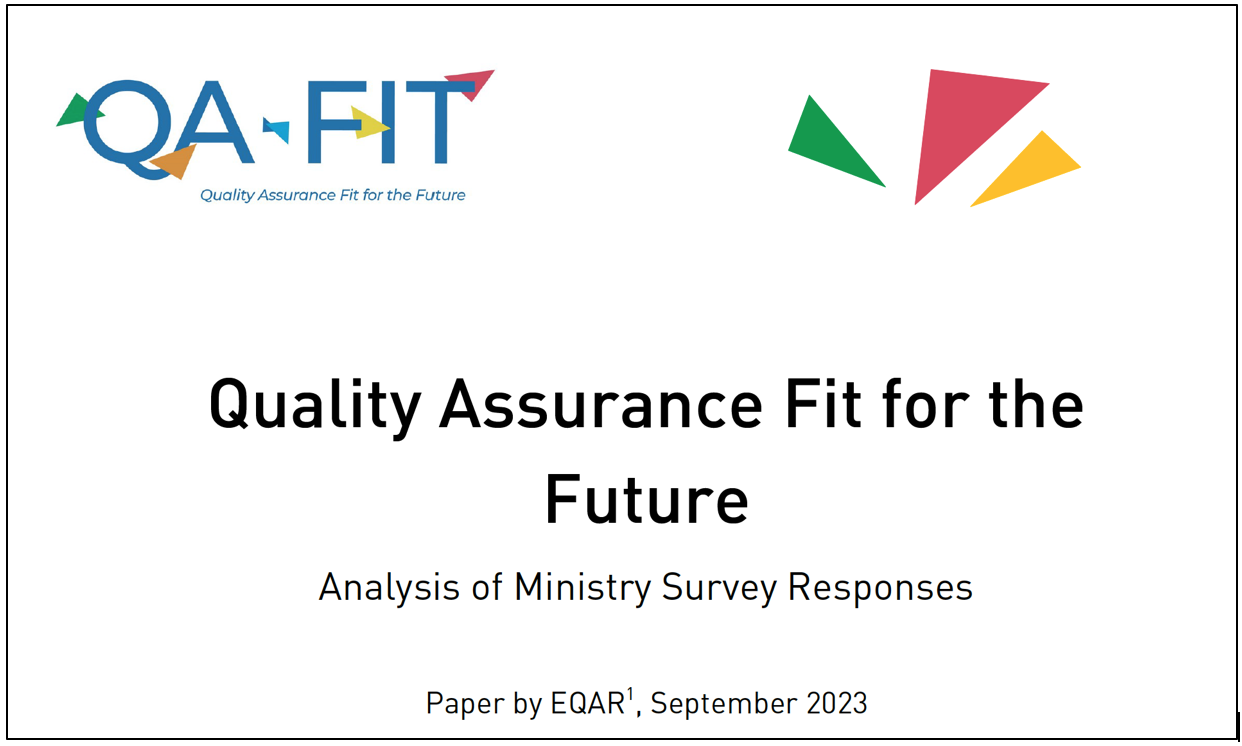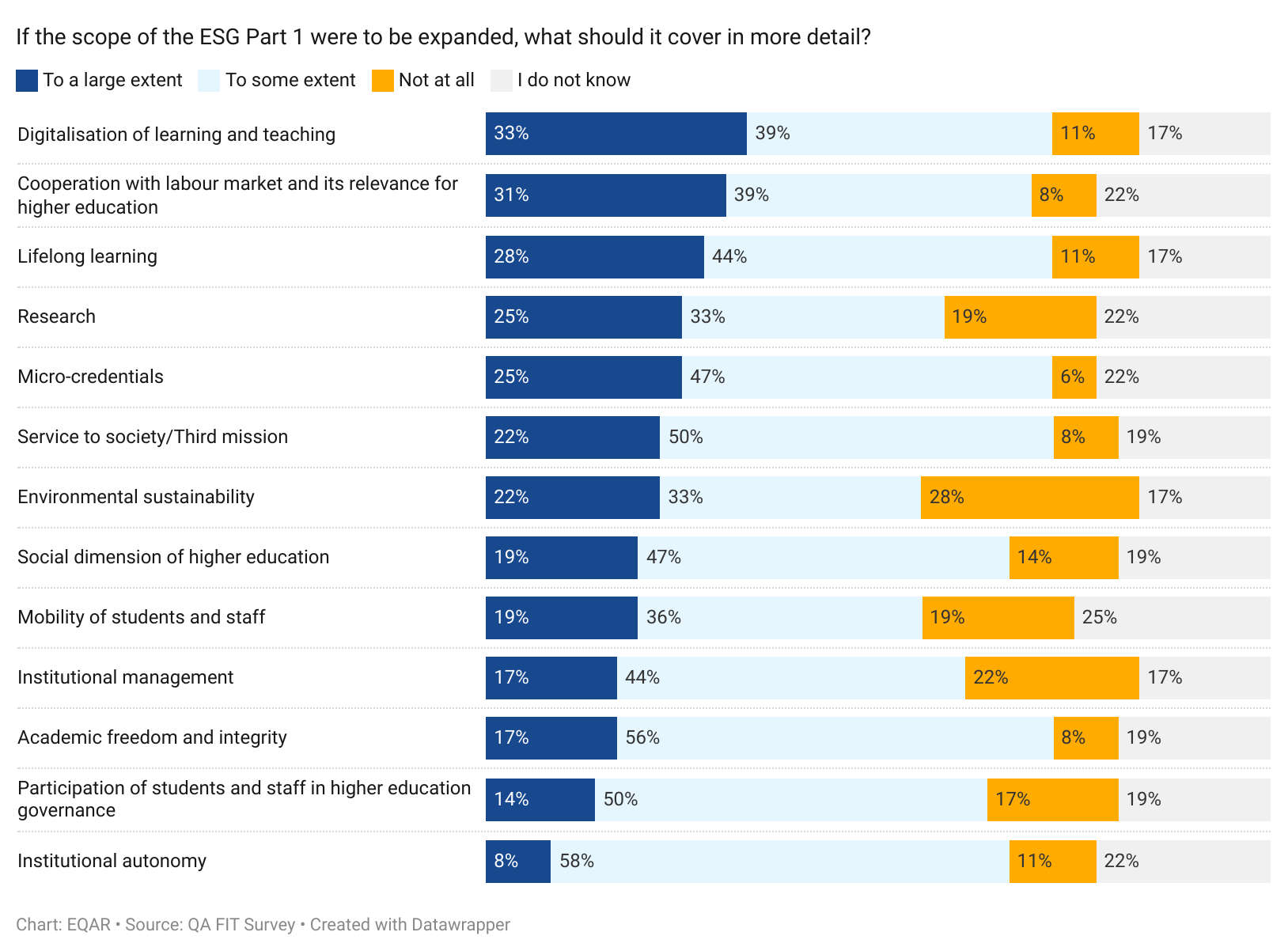
Publication of QA Fit analysis
We are pleased to announce that EQAR has finalised the “Analysis of Ministry Survey Responses” in the framework of the “Quality Assurance Fit for the Future” project.
Aim of the project
The aim of the Erasmus+ co funded Quality Assurance Fit for the Future (QA FIT) project is to comprehensively assess the state of quality assurance within the EHEA.
The project, led by ENQA, in partnership with EQAR, ESU, EUA, EURASHE, including as well a number of national organisations /authorities as partners i.e. IUA, FINEEC, ANOSR and MESG1 (associate partner) set out to critically evaluate whether the ESG are ready for the future and to ascertain whether an expansion of their scope is warranted. Furthermore, the project endeavours to solicit diverse viewpoints concerning the future trajectory of quality assurance within the EHEA.
Main activities
To this end the following project activities were envisioned, of which the first three have now been completed:
- Surveys to the main quality assurance stakeholders, namely higher education institutions, students, quality assurance agencies, and ministries.
- Papers to present findings from the surveys.
- Webinars, organised in conjunction with the publication of the papers.
- Focus groups to discuss in detail some of the matters arising from the surveys. (The focus group for ministries will take place at the EQAR Members’ dialogue in Granada.)
- Final publication and policy recommendations.
- Final conference in Brussels.
The survey to the ministries, EQAR’s responsibility of the project, yielded some very interesting results, which have been scrutinised and interpreted in the Analysis of Ministry Survey Responses. The paper is part of a comprehensive exercise to collect concrete evidence on the scope and implementation of internal and external quality assurance policies and practices, addressing emerging issues beyond the current scope of the ESG. The analysis of Ministry survey responses offers valuable insights into the state of quality assurance in European Higher Education Area (EHEA) and perceptions of its future.
-
Download the paper (September 2023) here:
-
Webinar & presentations survey results (May 2023)
-
Project page of the project coordinator (ENQA)
Survey questions and results
Questions revolved around various topics, such as:
- Defining the purpose of higher education.
- Defining the quality of higher education.
- The purpose of the external QA processes.
- The design of the external QA processes (how and by whom).
- The purpose of a European Framework for quality assurance.
- Current and future perspective on the ESG and the scope of the ESG.
Insights
Below some insights of the analysis to give you a taste of the expected “delights”:
- Emphasis on the accountability side of quality assurance.
This means that most often the principal outcome for QA in a HE system seems to be a decision granting permission for the institution or programme to operate and open new study programmes. A positive outcome of a QA activity also often provides the right to use the ‘university’ title and award university-level degrees, or allows the HE institution to access funding or state educational grants. - The enhancement role for external QA (e.g., formative advice on strengthening and enhancing quality) is nevertheless present in over half of the countries, showing a mix of accountability and enhancement approaches.
- Although the majority of respondents find the ESG’s current structure and principles effective, there is a call for minor to major revisions to address emerging trends and challenges such as digitalisation, micro-credentials, and the social dimensions of higher education.
Other interesting observations:
- Reflecting on the quality assurance of the university alliances, a large majority of respondents agreed that the European Approach for QA of Joint Programmes should be used in the evaluation of programmes offered by such alliances.
- The survey underscores the ESG’s role in fostering transparency and trust among member countries, with a focus on accountability-driven objectives. While employability is a priority, the limited emphasis on personal development and active citizenship raises questions. Respondents find the ESG effective but call for revisions to address emerging trends. This reflects an evolving understanding of universities’ holistic role in society and the need to adapt to changes in higher education. The commitment to internationalisation signals a collective effort to shape the future of quality assurance in Europe and beyond.
- The QA FIT survey for ministries was sent to all 47 governmental members of the European Higher Education Area (EHEA) and had a 78% response rate (36 ministries). Of those, 91% (33/36) are EQAR governmental members.
Another interesting result can be found in relation to possibly expanding the scope of the ESG, as can be viewed in the chart below.
